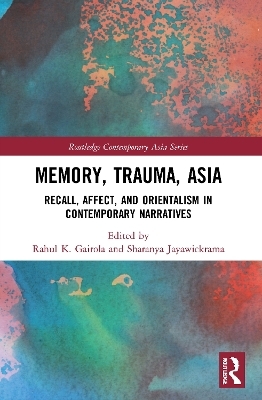
Memory, Trauma, Asia
Routledge (Verlag)
978-0-367-64501-4 (ISBN)
The contributors to this volume re-think established insights of memory and trauma theory and enrich those studies with diverse Asian texts, critically analyzing literary and cultural representations of Asia and its global diasporas. They broaden the scope of memory and trauma studies by examining how the East/ West binary delimits horizons of "trauma" by excluding Asian texts.
Are memory and trauma always reliable registers of the past that translate across cultures and nations? Are supposedly pan-human experiences of suffering disproportionately coloured by eurocentric structures of region, reason, race, or religion? How are Asian texts and cultural producers yet viewed through biased lenses? How might recent approaches and perspectives generated by Asian literary and cultural texts hold purchase in the 21st century? Critically meditating on such questions, and whether existing concepts of memory and trauma accurately address the histories, present states, and futures of the non-Occidental world, this volume unites perspectives on both dominant and marginalized sites of the broader Asian continent. Contributors explore the complex intersections of literature, history, ethics, affect, and social justice across East, South, and Southeast Asia, and on Asian diasporas in Australia and the USA. They draw on yet diverge from "Orientalism" and "Area Studies" given today’s need for nuanced analytical methodologies in an era defined by the COVID-19 global pandemic.
This book will be of great interest to students and scholars invested in memory and trauma studies, comparative Asian studies, diaspora and postcolonial studies, global studies, and social justice around contemporary identities and 20th and 21st century Asia.
Rahul K. Gairola, PhD (University of Washington, USA) is The Krishna Somers Senior Lecturer in English & Postcolonial Literature and a Fellow of the Asia Research Centre at Murdoch University in Greater Perth, Western Australia. He is co-editor and author/co-author of five books including South Asian Digital Humanities: Postcolonial Mediations across Technology's Cultural Canon (London: Routledge, 2020); Migration, Gender and Home Economics in Rural North India (New Delhi: Taylor & Francis, 2019); and Homelandings: Postcolonial Diasporas and Transatlantic Belonging (London & New York: Rowman & Littlefield, 2016). He is co-editor of special issues of Journal of Postcolonial Writing, South Asian Review, and Asiascape: Digital Asia, and previously taught at the Indian Institute of Technology Roorkee, India; The City University of New York, and Seattle University, USA. He is a lifetime member of Pembroke College, University of Cambridge, UK. Sharanya Jayawickrama, PhD (University of Cambridge, UK) was Assistant Professor in the Department of English Language and Literature at Hong Kong Shue Yan University, Hong Kong. She was previously Postdoctoral Fellow at the University of Macau and Lecturer in Literatures in English at the University of the West Indies, Jamaica. She was moreover an adjunct lecturer at the National University of Ireland, Galway, and King’s College, University of London, UK. Her published essays include field-shaping examinations of race, gender, and sexuality in Sri Lankan literature and culture. She passed away in September 2019.
1. The “Asian Pandemic”: Re-Thinking Memory and Trauma in Cultural Narratives of Asia Today (Rahul K Gairola and Sharanya Jayawickrama) Part I: Activating Memory as Personal Testimony 2. The Language of Trauma in Selected Short Stories by Gao Xingjian (Michael Ka-chi Cheuk) 3. Exorcising the Yellow Perils Within: Internment Trauma and Memory in Joy Kogawa’s Obasan and John Okada’s No Boy (Kerry S. Kumabe) 4. Healing from the Khmer Rouge Genocide by “telling the world”: Active Subjectivity and Collective Memory in Loung Ung’s First They Killed My Father (Nelly Mok) 5. Forgiving But Not Forgetting in The Garden of Evening Mists (Zhu Ying) Part II: Traumascapes of Body and State 6. Bonds and Companionship: the Healing Efficacy of the Picture Books of the 2011 Great East Japan Earthquake (Michelle Chan) 7. Tyrants, Typhoons, and Trauma: Spectrality and Magic Realism in Nick Joaquin’s Cave and Shadows (Jocelyn Martin) 8. Engendering Islam: Religio-Cultural Violence and Trauma in Qaisra Shahraz’s The Holy Woman (Elham Fatma, Rahul K Gairola, and Rashmi Gaur) 9. Transgenerational Hauntings in the landscape of Okinawa, Japan: Medoruma Shun’s “Army Messenger” (Kyle Ikeda)
| Erscheinungsdatum | 10.07.2023 |
|---|---|
| Reihe/Serie | Routledge Contemporary Asia Series |
| Zusatzinfo | 2 Halftones, black and white |
| Verlagsort | London |
| Sprache | englisch |
| Maße | 156 x 234 mm |
| Gewicht | 299 g |
| Themenwelt | Geisteswissenschaften ► Sprach- / Literaturwissenschaft ► Anglistik / Amerikanistik |
| Geisteswissenschaften ► Sprach- / Literaturwissenschaft ► Literaturwissenschaft | |
| Sozialwissenschaften ► Ethnologie ► Volkskunde | |
| Sozialwissenschaften ► Soziologie ► Spezielle Soziologien | |
| ISBN-10 | 0-367-64501-7 / 0367645017 |
| ISBN-13 | 978-0-367-64501-4 / 9780367645014 |
| Zustand | Neuware |
| Informationen gemäß Produktsicherheitsverordnung (GPSR) | |
| Haben Sie eine Frage zum Produkt? |
aus dem Bereich


